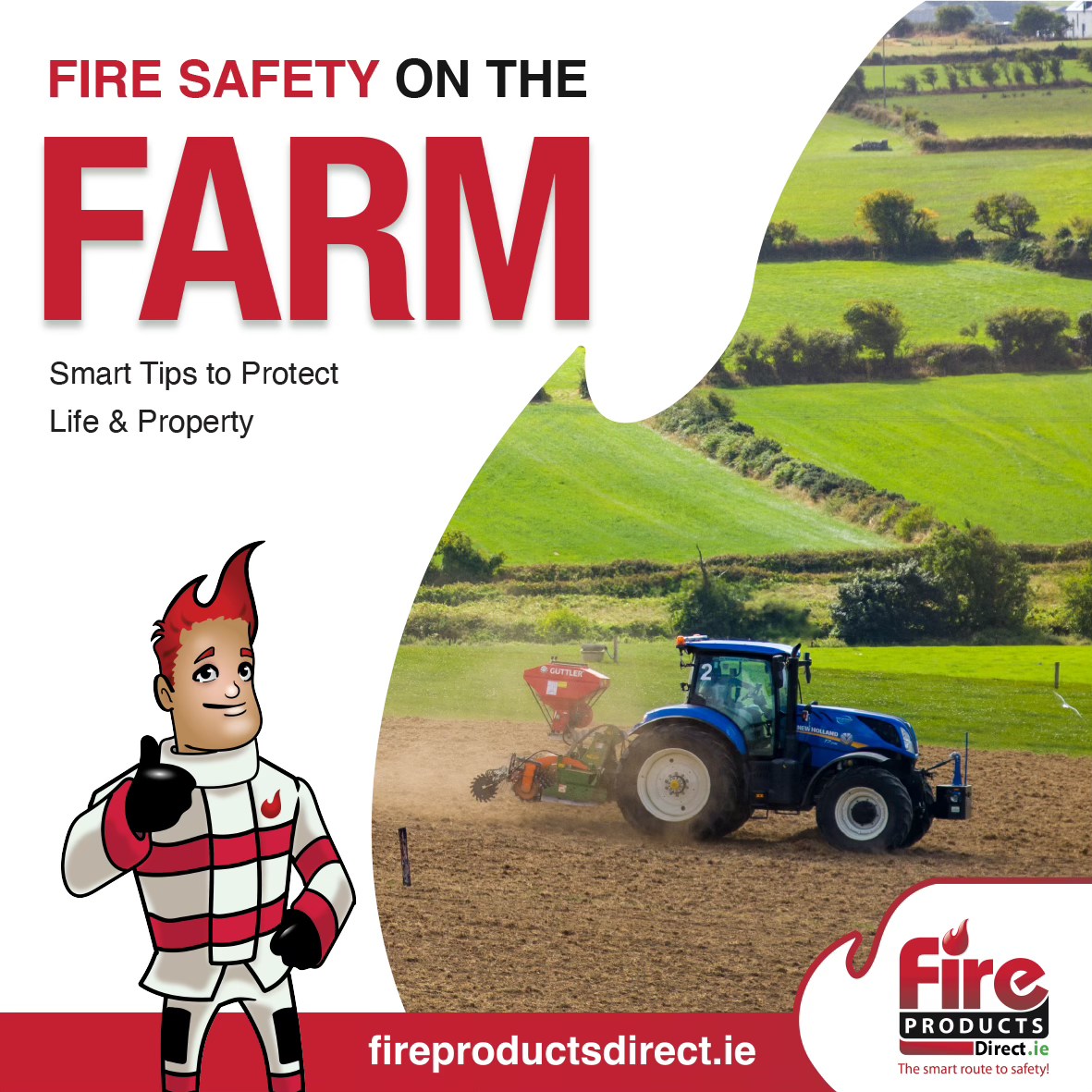
Farming is the backbone of rural life in Ireland and with the many activities and different types of machinery involved, it’s crucial to be aware of the fire risks on the farm.
From sheds and tractors to hay bales, knowing how to spot and mitigate fire hazards can prevent devastating losses.
1.Identifying Fire Risks on the Farm
SHEDS AND BARNS
Electrical Faults: Faulty wiring, overloaded circuits, and poor electrical installations are common fire hazards.
Stored Materials: Combustible materials like hay, straw, and chemicals can catch fire easily if not stored properly.
TRACTORS AND MACHINERY
Fuel Leaks: Leaks from fuel tanks or lines can ignite from a spark.
Mechanical Failures: Overheated engines and faulty exhaust systems can start fires.
HAY BALES
Overheating: Moisture in hay bales can lead to spontaneous combustion due to microbial activity generating heat.
Storage: Poor ventilation in storage areas can contribute to overheating.
Cigarette Butts: Be aware of discarded cigarette butts. These can ignite fields of standing crops, dry grass etc
Glass: Bottles and Broken Glass left in grass or woodlands can act as a magnifying lens under the sun, causing dry vegetation to catch fire.
Arson: Farms can be targets of arson, where fires are deliberately set to cause damage.
2. Preventing Fires
Proper Storage: Store hay and straw in well-ventilated areas. Avoid stacking bales too tightly.
Keep fuels and chemicals in designated, ventilated storage areas, away from ignition sources.
Maintenance: Regularly service all machinery and tractors. Keep engines clean and well-maintained.
Ensure electrical systems are up to code and inspected by a professional.
Fire Breaks: Maintain clear areas around buildings and haystacks to act as fire breaks.
3.Being Prepared
Fire Extinguishers: Equip your farm with the appropriate fire extinguishers and ensure they are easily accessible. Train all farm workers on how to use fire extinguishers properly.
Fire Blankets and Buckets: Keep fire blankets in key locations, such as machinery sheds and barns. Have buckets of sand or water readily available.
Smoke Detectors: Consider Installing smoke alarms in any buildings on the farm to give you an early warning of a fire starting – every second counts!
Emergency Plan: Develop a fire emergency plan that includes evacuation routes and contact information for emergency services.Conduct regular fire drills with all farm personnel to ensure everyone knows what to do in case of a fire.
4.What to Do If a Fire Starts
Stay Calm and Assess: Quickly assess the situation to determine the size and source of the fire.
Raise the Alarm: Alert everyone on the farm immediately. Ensure all workers and family members are aware of the fire and begin evacuation if necessary.
Call Emergency Services: Contact the fire brigade as soon as possible, providing clear details about the location including your Eircode and nature of the fire.
Use Fire Extinguishers: If the fire is small and manageable, use a fire extinguisher or blanket to try and put it out. Always ensure you have a clear exit route before attempting to fight a fire.
Fire safety on the farm requires vigilance, regular maintenance, and preparedness. By identifying potential hazards, taking preventive measures, and being ready to act swiftly, you can protect your farm, livestock, and loved ones from the devastating effects of fire.
Check our store for any fire safety equipment you may need on the farm.
Be Smart. Be Prepared. Be Safe.
Remember: If You Discover a Fire
- Raise the alarm
- Evacuate the premises
- Call 999 or 112
- Only tackle the fire if safe to do so
Still have questions? Feel free to give us a call or email us on info@fireproductsdirect.ie







